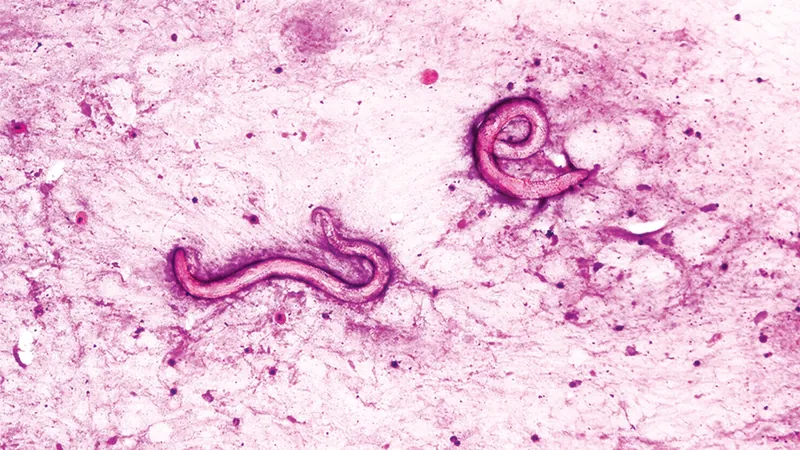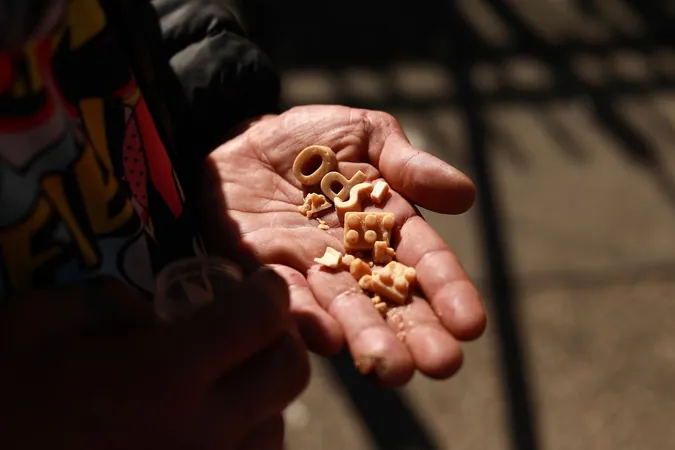
Shocking Discovery: Men Left Infested with Parasitic Worms After Kidney Transplants
2025-07-01
Author: Amelia
A Terrifying Medical Nightmare
In a startling revelation, two men have found themselves battling alarming parasitic infections following kidney transplants at U.S. hospitals. The nightmare began when both organs came from the same donor, who hailed from the Caribbean.
The First Victim's Struggle
The first recipient, a 61-year-old man, underwent surgery at Massachusetts General Hospital (MassGen). Just ten weeks post-transplant, he returned to the hospital, gripped by a cascade of troubling symptoms: severe nausea, relentless vomiting, disturbing abdominal pain, and a fever that plunged him into respiratory failure.
Upon arrival, doctors discovered alarming fluid buildup in his lungs, and a purplish rash began spreading across his stomach—clues that hinted at a severe underlying infection.
Unraveling the Mystery
Medical staff, including renowned infectious disease expert Dr. Camille Kotton, were on a mission to uncover the cause. With the man already on immunosuppressive medications to prevent kidney rejection, he was vulnerable to various infections. Antibiotics had failed, ruling out bacterial sources, and tests showed he was clear of COVID-19. This only left the possibility of a parasitic infection.
The Alarming Diagnosis
The breakthrough came when Dr. Kotton recalled cases involving the small roundworm Strongyloides stercoralis and contacted New England Donor Services. Testing revealed that the donor's blood had antibodies for this fearsome parasite. The man had initially tested negative for the worm before the transplant, but post-transplant tests confirmed its presence.
As they investigated further, it became clear: the parasites had invaded his abdomen, lungs, and skin.
A Rare but Serious Threat
Infections from transplant organs are rare, with statistics showing only 14 out of 10,000 organ transplants leading to donor-derived infections. However, the findings of this case are a stark reminder of the potential dangers that lurk beneath the surface, prompting calls for better screening protocols.
A Life-Saving Treatment
The patient was treated with ivermectin, a potent antiparasitic medication that was administered directly under his skin, leading to a successful and complete recovery.
The Ripple Effect
Meanwhile, news of the contaminated donor spread to other hospitals. At Albany Medical Center, another patient—66 years old—who had received the second kidney, was experiencing fatigue and declining health. Thanks to swift communication among medical teams and infectious disease specialists, this patient was also successfully treated.
As a spokesperson for Albany Medical Center remarked, "In rare cases like this, the collaboration and coordination between hospitals were critical in saving lives."
A Call for Action
This alarming case has reinvigorated discussions on the importance of universal screening for Strongyloides and potentially other parasites in organ transplant protocols, to prevent future risks and ensure patient safety.









 Brasil (PT)
Brasil (PT)
 Canada (EN)
Canada (EN)
 Chile (ES)
Chile (ES)
 Česko (CS)
Česko (CS)
 대한민국 (KO)
대한민국 (KO)
 España (ES)
España (ES)
 France (FR)
France (FR)
 Hong Kong (EN)
Hong Kong (EN)
 Italia (IT)
Italia (IT)
 日本 (JA)
日本 (JA)
 Magyarország (HU)
Magyarország (HU)
 Norge (NO)
Norge (NO)
 Polska (PL)
Polska (PL)
 Schweiz (DE)
Schweiz (DE)
 Singapore (EN)
Singapore (EN)
 Sverige (SV)
Sverige (SV)
 Suomi (FI)
Suomi (FI)
 Türkiye (TR)
Türkiye (TR)
 الإمارات العربية المتحدة (AR)
الإمارات العربية المتحدة (AR)